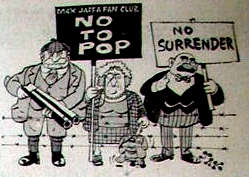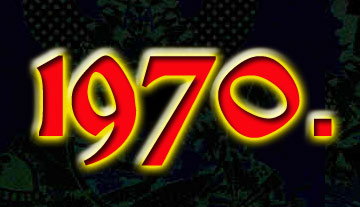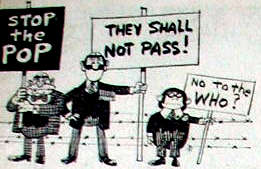|
|
Big
BIG thanks to our sponsor Neil !
For information
on today's festivals
see eFestivals.co.uk
|
Updated Feb 2019, New
pictures of the site and audience
Dec 2011 new photos of the Pye
Recording crew and Miles Davis's engineer Stan Tonkel and producer Teo Macero
Best viewed at 1920 x 1024 res .
NB: MEDIA-
If requesting contact details to use images for publication, please send the
url, image file and name of Photographer to us so its easier to give you their
contact details. Due to the impermanent nature of the web, people change addys
frequently- so we don't have contact with all of our contributors.
|
UPTIGHT
ON THE ISLE OF WIGHT
…..the
fight for the festival
|
|
|
Even
if Dylan did not stay long enough to satisfy his most enthusiastic fans,
the Second Isle of Wight Music Festival last year went out in a blaze of
glory. It was generally agreed that the kids had behaved surprisingly well.
The nearest thing to a disaster had been a small fire in a fish and chip
van and there were only a handful of arrests on minor charges. Both the
local bus company and British Rail were quick to lavish praise on the exemplary
behaviour of the 100.000 rook fans.
And even if the Isle of Wight County Press described the event rather grudgingly
as "more like a Hindu prayer meeting on the Ganges than a music festival
in our garden isle", the Portsmouth News waxed Iyrical in its editorial
column: "A large part of a glacier of prejudice melted away this weekend.
Let the hippies ring out their little bells, for social history was made
in that Island field." |
But
the brief spell of mutual backslapping proved to be the calm before the storm.
Before the last rock fan had been herded from the precariously laden Ryde Pier
on to the departing ferries, the local Tourist Board was reported to be worried
that the Island's "family image" has been irreparably tarnished. The
cause of their anxiety was the national publicity given to the nude frolickings
of half a dozen freaks at the festival. The local branch of the Women's Institute
near the festival Site agreed that they were none too keen on "hippies"
sleeping at the bottom of their gardens.
Meanwhile the Senior Public Health Inspector for Newport Rural District Council
was making a detailed report on the hygenic conditions at the site.
It was far from complimentary.
Mr R W Cawdell, secretary of the Island’s Vectis Nationalist Party, ("UDI
of IOW") also Councillor for Ryde, criticised the toilet facilities at
the site. The Island's Tory MP, Alderman Mark Woodnutt (majority 17.326) was
pushing for Parliamentary legislation to control pop festivals in time for the
1970 season.
And the Isle of Wight County Council set up a 14-man Select Committee, chaired
by Alderman Woodnutt, to investigate the whole pop festival phenomenon.
Predictably, the first major
offensive was launched on September 17, 1969, at a public meeting in the village
hall at Wootton - the scene of the last festival. It was sponsored by the Wootton
and Fairlee Ratepayers' and Residents' Association - which had been involved
in the fight to prevent the hovercraft landing near Wootton the year before.
A number of Island residents were present. Both the County and Borough Councils
were represented and were bombarded with questions about blaring music, blocked
roads and filth. Also present was Ray Foulks, joint managing director of Fiery
Creations Ltd.- the promoters.
The meeting finally voted to
set up a fund get the festival banned, but by April the organisers were reportedly
distressed that with donations running at an opulent two guineas a head only
£200 had been raised.
A fighting fund
| The
meeting highlighted the attitudes of the central characters in the drama.
The councillors argued that they were hampered by the lack of any real power
in the form of legislation to control pop festivals. The residents, despite
their claims to have nothing against pop festivals as such, could see no
good reason why they should take place on their Island, let alone their
very doorsteps. As for the promoters, in the words of Ray Foulks "If
the Island people do not want a festival here, we will go elsewhere. I mean
the Island people, not a handful of people in a Wootton schoolroom".
|
 |
The
Wootton meeting had started the anti-festival bandwagon rolling. It gave a firm
mandate to Mark Woodnutt to do his utmost to get effective legislation through
parliament in time for 1970. Shortly afterwards both Newport and Ryde Borough
Councils came out in favour of similar legislation.
With the November publication in the local paper of the text of a letter from
Woodnutt to Arthur Skeffington, Joint Parliamentary Secretary to the Ministry
of Housing and Local Government, the promoters and the MP were shown publicly
to be at loggerheads.
Adopting a somewhat Cassandra-like
tone, Mr. Woodnutt wrote, "the organisers of last year's festival are planning
a similar event next year and if the local authority is not, by then, in possession
of powers to lay down and enforce sanitation regulations, the health of everyone
in the Isle of Wight will be endangered."
He added that it needed "only a hot dry week-end to bring about an epidemic"
and went on to refer to "the August Bank Holiday weekend last year when
150.000 people slept out in the open for several nights and left behind them
a scene of in-describable filth."
The letter outlined the sort
of legislation Mr. Woodnutt had in mind. It was to cover gatherings of 500 or
more and included power to refuse permission for more than 50 people to sleep
overnight in a temporary encampment. It was quite clear that this kind of legislation
would have put paid to any plans for a third festival.
The following week Fiery Creations
hit back. They argued that the festival had ploughed back more than £250,000
into the Island and stated flatly that they were looking for a bowl-shaped site,
capable of taking 250,000 fans for 1970.
In the following months the idea of getting legislation on the statute books
in time for August 1970 was quietly shelved. The Select Committee settled for
second best by asking Fiery to enter into an agreement controlling the basic
standards of hygiene, security and movement at the festival. This suggestion
was welcomed by Fiery.
But what the local' authorities
lacked in practical powers, certain of the residents more than made up for in
determination. So much so that by March the promoters were leapfrogging around
the East Wight looking for sites in the face of mushrooming residents associations,
and even, they claimed, threats to life and property.
In April, largely to forestall further hysteria. Fiery Creations began secret
discussions with Newport Borough Council over land at Goshens, near the site
of the last festival, The drama took on all the aspects of high-comedy when
an alderman on the council leaked the site details in the public interest, he
later claimed. But negotiations for Goshens land and a subsequent site near
Havenstreet, also in the East Wight, proved fruitless. In the former case the
site was judged far too small by the County Council. They threatened an injunction
but were beaten to it by Wootton and Fairlee ratepayers who, at a hearing in
the High Court on July 13, scored what amounted to a successful injunction.
They were even awarded costs against the promoters.
A new site
In July, with only seven weeks
to go and committed to the tune of £150,000 in artists' fees, the young
men at Fiery gave
up the fight in the East Wight, and moved west. On July 14, they announced a
site at East Afton near Freshwater in the west of the Island. Almost simultaneously,
the Island branch of the National Farmers' Union came out against the festival,
(Fiery placated them later by taking out a million pound insurance policy covering
damage to farm property). The County Council dispatched the Public Health Inspector
and Rear-Admiral Clarke, county councillor and member of the select-committee,
to inspect the "morning after" scene at 1970's other monster festival
at Bath. Nevertheless, East Afton was to be the final site. On July 24 agreement
was finally reached between the three parties, the Select Committee, the RDC
and Fiery.
The councils struck a hard bargain.
They demanded 1200 toilets instead of the 80 provided the previous year: a double
wall around the arena, and fencing to protect the adjacent National Trust property.
The promoters were also required to deposit £4,000 in bonds and about
£1,200 in cash as security, and to provide tents for local authority personnel
to act as watchdogs on the festival site.
Fiery Creations was at last free
to get on with building, and organising the festival.
Eithne
O'Sullivan
Contents
Isle of Wight 1970 festival
menu
updated March 2019
The Underground
press- NB: opinions
expressed in these articles do not represent our opinions of the organisers
or any other people involved in the running of the festival, it is possible
that they may be innaccurate in some details or facts.
- Friends
Article ; Richard Nevilles review- A Race Of Bloody
Masochists.
- Friends
Article ; Anarchists, White Panthers ,Desolation Hill, The Angels
- Friends
Article : The Police, Drugs, Food.
- Friends
Article : Freek Press, The Beach , Community Aid ,Money.
- Friends
Article : The Concerts, the Music.
- Friends
Article : Guerilla Medicine , The straight press.
- Friends
Article : Hawkwind and PInk Fairies.
- Friends
Article : Rupert finds d...s at IOW
- Freek
press No 1 - 8 -updated August 2007- new copies and updates
- Fairfield
Parlour- Let the World Wash In
International
Times.
Reports from the
"Straight "press
updated March 2019
External
links
The
White Panthers
Other
IOW festivals.
1968
Isle of Wight festival
1969
Isle of Wight festival
If
you have any info you can contribute to the site, especially regarding the 1968
and 1969 festivals, such as details of recordings. recollections, programmes,
tickets, pix or articles
don't just sit there , Contact
us
Back
to the main Archive.




